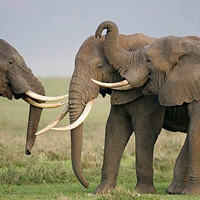African Success Stories Show Wildlife And People Can Both Win

 |
| African Elephants |
The success stories appear in the proceedings of a conference held in March, which will be launched at a side event Chaired by Juliette Biao, Minister for the Environment and Nature Protection, Benin at the invitation of the French government and attended by France’s Ambassador, Laurent Stefanini.
“Wildlife conservation and sound management can deliver development benefits for local communities in African countries,” says Nesbert Samu of the African Wildlife Foundation. “This publication shows what is possible and highlights the importance of sharing best practices between different countries and regions.”
This can be controversial. Rich hunters are willing to pay €10,000 or more to shoot an elephant or a mature lion, money that would go a long way to supporting local livelihoods and conservation of these species but which would collide head-on with Western values on biodiversity conservation. International organisations tend to see biodiversity conservation as an end in itself but rural farmers in Africa tend to see it as a means to an end, as an investment that generates income, food or well being.
The March conference in Niamey, Niger, was the first attempt in ten years to gather experts from French and English speaking African countries that are working on conservation and development projects.
It was organised by the Zimbabwe-based Bio-Hub initiative which regional NGOs set up in 2005 with funding from the French government (French Global Environment Facility) to promote wildlife conservation and sound management as a development opportunity and share information between projects in Eastern and Southern Africa.
“Much progress has been made in Southern Africa,” says Sebastien Le Bel, Director of the Bio-Hub programme. “We need to work out how to spread the positive lessons to West and Central Africa, which are less rich in wildlife than the East and South.”
The side event will highlight innovative community-based approaches to managing natural resources and conserving wildlife. Namibia for example has devolved the right to manage wildlife and plants to local communities through Communal Conservancies that now cover 14% of the country and hold 12% of the country’s population. Cash income for communities from the sale of wildlife products, ecotourism, hunting and use of plants has increased 10 fold between 2000 and 2006. In 2007, direct incomes to conservancies reached €2.3 million. Meanwhile wildlife is thriving and increasing well outside the borders of Namibian National Parks.
Illegal hunting has been largely eradicated. The total gross value of tourism and wildlife products was estimated at €270 million in 2005 — more than double that of agriculture. Communities spend their incomes on clinics, school bursaries, water installations or support for HIV & AIDS orphans or other measures for community benefit. They also provide resources and support directly to household in well-established conservancies.
For a long time conservation has excluded people and often ignored their rights to land use and livelihoods, such as when they are excluded from national parks. Local communities are often seen more as potential poachers, rather than partners for conservation and development.
“A key outcome of this project is that communities can protect local wildlife and improve their livelihoods at the same time. These objectives do not need to compete,” says Laurent Stefanini, Ambassador for the French Ministry of Foreign Affairs.
“By showing how empowerment of local communities to directly manage their own wildlife resources can work, desertification and climate change could be addressed in the same way” said Jamie Skinner of the International Institute for Environment and Development, IIED, who helped organise the event.
For more information please contact:
Jamie Skinner, International Institute for Environment and Development, 0131 226 6866 (2 and 3 October) then 00 44 782 46 84 660 (from 7 Oct in Barcelona)
Jamie.skinner@iied.org
Mike Shanahan, International Institute for Environment and Development 00 44 207 388 2117 mike.shanahan@iied.org
You will then be put in contact with relevant workshop participants in Barcelona.
The bilingual side event: “Diversity in bio-conservation strategy through community-based initiatives in Africa; the Bio-Hub platform experience” will take place on 8 October at 18.30-20.00 in room CCIB 116.
Bio-Hub’s mission is to integrate conservation and development through a unique pan-African partnership which promotes innovations, transfer of skills, technology and knowledge through incentive based approaches Bio-Hub provides information, technical and institutional support services to wildlife agencies and community based organisations, and promotes best practice through networking and exchange.
In this framework, an international workshop was organized in Niamey (March 2008) gathering practitioners, researchers and donors from 12 African and 6 European countries. This initiative was co-funded by the French Ministry of Foreign and European Affairs, the French Global Environment Facility (FFEM), CIRAD, EU and IUCN Regional Office for West Africa. One of the main outputs of this event was the launching of a network bridging specialists from Central, Western and Southern Africa.
This network will provide recommendations, operational guidelines and conceptual principles for donors, practitioners and researchers working on Community Based Natural Resource Management.
